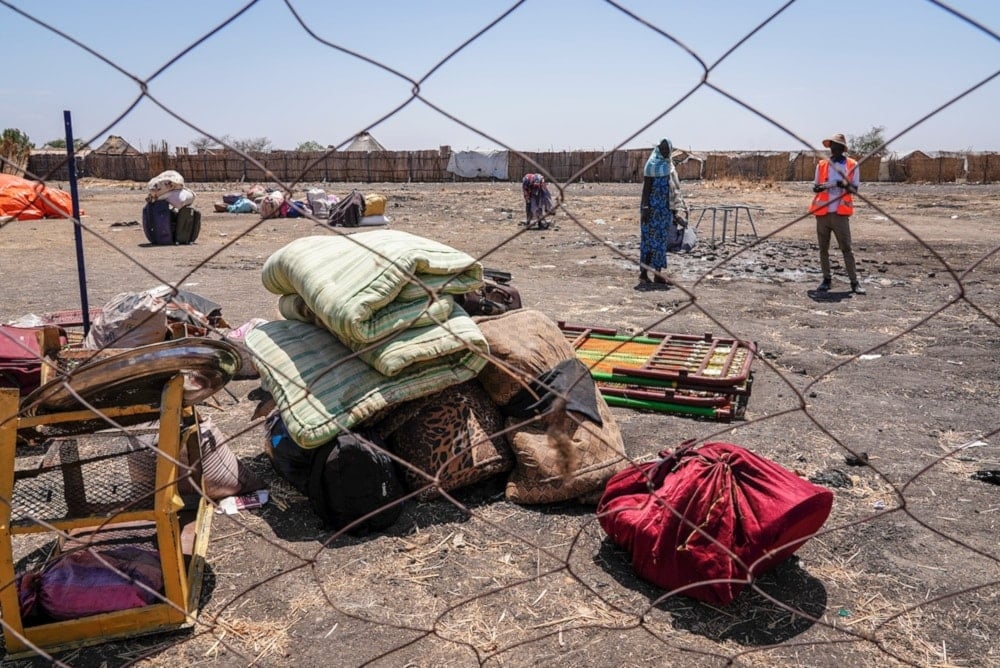Sudan's famine crisis deepens amid ongoing conflict: UN-backed report
The Integrated Food Security Phase Classification (IPC) review reveals that famine has now reached two additional displacement camps in the west and parts of the south of Sudan.
-

The belongings of people who crossed the border from Sudan sit in a yard at the Joda border crossing in South Sudan on Tuesday, May 16, 2023. (AP)
Famine is spreading across war-torn Sudan, with projections indicating further expansion, according to a UN-backed report released on Tuesday.
The Integrated Food Security Phase Classification (IPC) review, used by UN agencies, revealed that famine has now reached two additional displacement camps in the west and parts of the south of Sudan.
The ongoing 20-month conflict between the Sudanese army and the paramilitary Rapid Support Forces, led by rival generals, has caused a severe humanitarian crisis. Since the war began in April 2023, tens of thousands of people have been killed, and 12 million displaced, resulting in what the United Nations has labeled the world’s largest displacement crisis.
Dive deeper
The IPC’s latest findings show that 638,000 people are experiencing catastrophic levels of hunger, with an additional 8.1 million at risk of famine.
UN Secretary-General Antonio Guterres expressed deep concern, urging his call "for the parties to facilitate rapid, safe, unhindered and sustained access so that humanitarian assistance and staff can reach people in need."
The IPC identified famine in three camps in North Darfur, including Zamzam, where famine was declared in August, and among displaced communities in the Nuba Mountains in the southern Kordofan region.
Between December and May, 24.6 million people—roughly half of Sudan’s population—are expected to face “high levels of acute food insecurity,” marking an unprecedented worsening of the food crisis, the report emphasized.
According to the UN's World Food Programme (WFP), areas like parts of Khartoum and Al-Jazira state may already be experiencing famine conditions, although lack of access to data has prevented official confirmation.
Guterres emphasized on Tuesday the urgent need for "an immediate cessation of hostilities to save lives and prevent the crisis... from escalating even further in 2025."
Alarming spread of famine across North Darfur
The IPC’s report also highlighted 17 additional areas at risk of famine, particularly in western and central Sudan, and predicted that famine would likely spread to five more parts of North Darfur by May, where some of the fiercest fighting has occurred.
Aid group Save the Children called the findings "terrifying," with its humanitarian director for Sudan, Mary Lupul saying that "the deepening crisis showed "a failure of the global system."
"Children are famine's first victims and are already facing avoidable and excruciating deaths due to malnutrition and disease," she said.
Lupul called for "immediate, unhindered access through all border crossing and across the country to provide large-scale humanitarian assistance and commercial deliveries."
In October, UN experts accused both warring sides of using "starvation tactics" against civilians. Aid agencies report that the army-aligned government has placed bureaucratic barriers to aid, leveraging its legitimacy to close key access points.
Only two UN convoys have reached the Zamzam camp since famine was declared, and the nearby state capital of el-Fasher has been under siege by the Rapid Support Forces.
With nearly all of Darfur now controlled by the RSF, and the army holding the north and east, WFP’s Jean-Martin Bauer warned that "a protracted famine is taking hold in Sudan."
"People are getting weaker and weaker, and are dying as they have had little to no access to food for months and months," Bauer warned.
Read more: Sudan: A borderless conflict

 4 Min Read
4 Min Read










